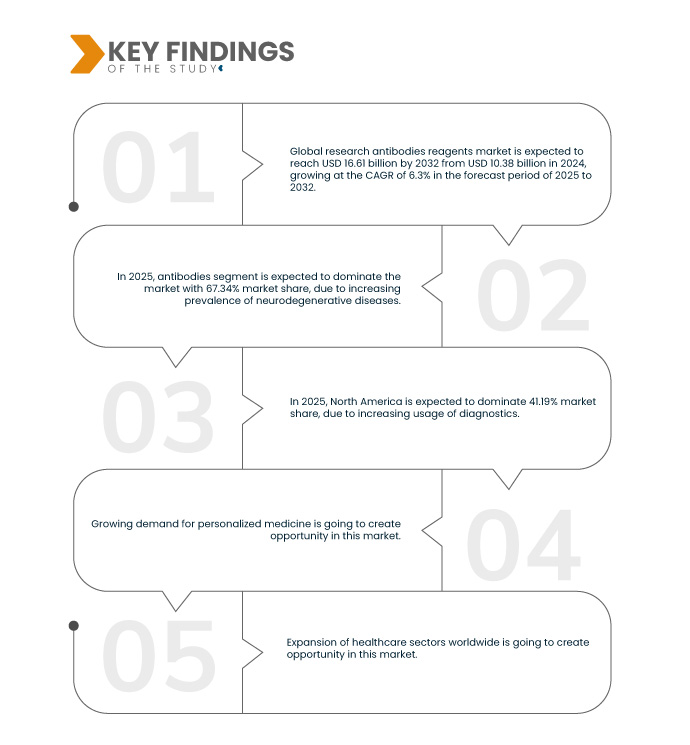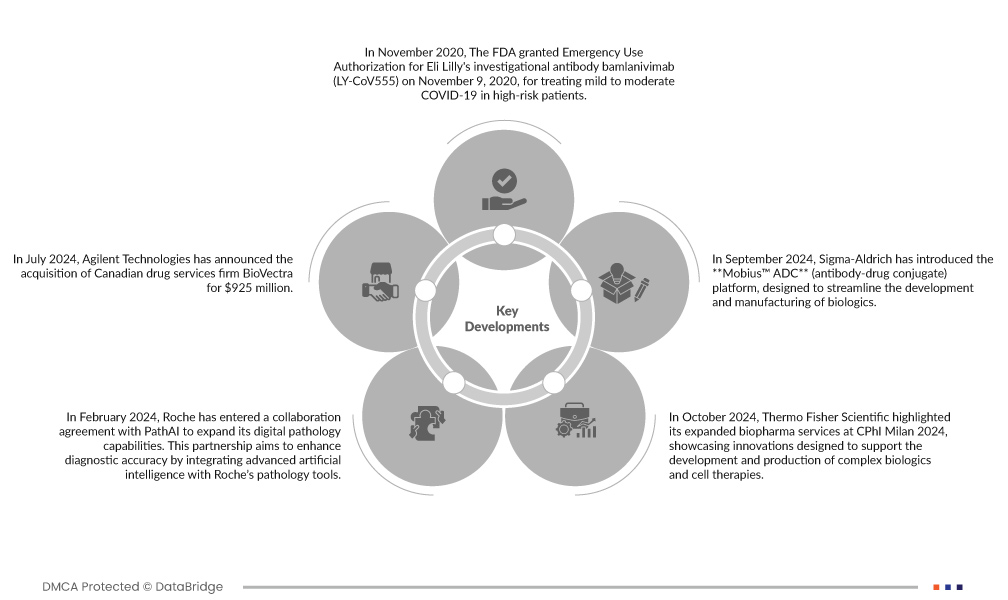Os avanços tecnológicos desempenham um papel crucial no impulso do mercado global de reagentes de anticorpos para investigação, permitindo o desenvolvimento de produtos de anticorpos mais específicos, eficientes e diversificados. Inovações como os processos de produção de anticorpos monoclonais, a tecnologia de exibição de fagos e as tecnologias de ADN recombinante melhoraram significativamente a capacidade de produzir anticorpos de alta qualidade com especificidade e afinidade melhoradas. Estas tecnologias permitem aos investigadores criar anticorpos adaptados a alvos específicos, o que é essencial em diversas aplicações, incluindo o desenvolvimento de medicamentos, diagnósticos e investigação básica. A evolução contínua das técnicas de rastreio de alto rendimento e a integração de ferramentas de bioinformática aceleram ainda mais a descoberta e validação de novos anticorpos, conduzindo a uma gama mais ampla de reagentes disponíveis no mercado e atendendo às diversas necessidades da comunidade científica.
Além disso, os avanços nas técnicas analíticas, como a espectrometria de massa e a sequenciação de última geração, estão a transformar a forma como os anticorpos são caracterizados e validados. Estas inovações facilitam resultados de investigação mais robustos e reprodutíveis, aumentando assim a fiabilidade dos dados gerados pelos estudos que utilizam reagentes de anticorpos. À medida que os investigadores e os laboratórios exigem maior precisão e fiabilidade nas suas experiências, a necessidade de reagentes de ponta torna-se primordial. Desta forma, as empresas que investem e adotam estes avanços tecnológicos podem melhorar as suas ofertas de produtos, melhorar a satisfação do cliente e, por fim, aumentar a sua quota de mercado no panorama competitivo do mercado global de reagentes para anticorpos de investigação.
Aceda ao relatório completo em https://www.databridgemarketresearch.com/reports/global-research-antibodies-reagents-market
A Data Bridge Market Research analisa que o mercado global de reagentes para anticorpos de investigação deverá atingir os 16,61 mil milhões de dólares até 2032, face aos 10,38 mil milhões de dólares em 2024, crescendo com um CAGR substancial de 6,3% no período previsto de 2025 a 2032.
Principais conclusões do estudo
Aumento da prevalência de doenças neurodegenerativas
A crescente prevalência de doenças neurodegenerativas, como Alzheimer, Parkinson e esclerose lateral amiotrófica (ELA), está a aumentar significativamente a procura de reagentes de anticorpos para investigação no mercado global. À medida que a incidência destas doenças aumenta devido a factores como o envelhecimento populacional e as mudanças no estilo de vida, há uma necessidade urgente de investigação contínua para descobrir os seus mecanismos subjacentes, identificar biomarcadores para o diagnóstico precoce e desenvolver tratamentos eficazes. Os anticorpos desempenham um papel fundamental nesta investigação, pois são ferramentas essenciais para estudar os processos patológicos envolvidos nas doenças neurodegenerativas. Este crescente foco na compreensão e no combate às doenças neurodegenerativas está a alimentar o investimento no desenvolvimento de anticorpos específicos para atingir proteínas associadas a estas doenças, expandindo assim o mercado de reagentes de anticorpos para investigação.
Além disso, o aumento do financiamento e dos recursos alocados à investigação em neurociência — tanto por parte de organismos governamentais como de organizações privadas — cria um ambiente propício ao crescimento do mercado de reagentes de anticorpos. À medida que as empresas farmacêuticas e de biotecnologia intensificam os seus esforços para desenvolver novas terapias, incluindo anticorpos monoclonais e outros produtos biológicos para tratar doenças neurodegenerativas, a procura de anticorpos e reagentes de investigação de alta qualidade para apoiar estudos pré-clínicos e clínicos está a aumentar. Esta tendência traduz-se em oportunidades para as empresas especializadas na produção de anticorpos e reagentes relacionados, permitindo-lhes melhorar as suas ofertas de produtos e contribuir para o avanço dos tratamentos para as doenças neurodegenerativas, beneficiando, em última análise, os doentes e os sistemas de saúde.
Âmbito do Relatório e Segmentação de Mercado
Métrica de Reporte
|
Detalhes
|
Período de previsão
|
2025 a 2032
|
Ano base
|
2024
|
Anos Históricos
|
2023 (personalizável para 2013-2017)
|
Unidades quantitativas
|
Receita em biliões de dólares americanos
|
Segmentos abrangidos
|
Tipo (Anticorpos e Reagentes), Aplicação (Ensaio de Imunoadsorção Enzimática, Western Blotting , Imunohistoquímica, Citometria de Fluxo , Reação em Cadeia da Polimerase e Outros), Área de Investigação (Imunologia, Biologia Celular e Molecular, Neurociência, Genómica e Proteómica, Biotecnologia e Descoberta de Fármacos, Microbiologia e Outros), Utilizador Final ( Fabricantes Farmacêuticos e Biofarmacêuticos, Institutos Académicos e de Investigação, Organizações de Investigação Empreiteiros (CROs), Hospitais e Laboratórios de Diagnóstico e Outros), Canal de Distribuição (Vendas Diretas, Vendas a Terceiros e Outros)
|
Países abrangidos
|
EUA, Canadá, México, Alemanha, França, Reino Unido, Itália, Espanha, Suíça, Rússia, Bélgica, Holanda, Turquia, Resto da Europa, China, Japão, Índia, Coreia do Sul, Austrália, Singapura, Tailândia, Malásia, Indonésia, Filipinas, Resto da Ásia-Pacífico, Brasil, Argentina, Resto da América do Sul, África do Sul, Israel, Arábia Saudita, Emirados Árabes Unidos, Egito, Resto do Médio Oriente e África
|
Participantes do mercado abrangidos
|
Thermo Fisher Scientific (EUA), MilliporeSigma (EUA), Santa Cruz Biotechnology (EUA), Danaher (EUA), Perkinelmer Inc (EUA), F.Hoffmann La Roche Ltd. (Suíça), Rockland Immunochemicals Inc (EUA), Johnsons & Johnsons (EUA), Agilent Technologies Inc. (EUA), Eli Lily and Company (EUA), BD (EUA), Genscript Biotech Corporation (EUA)
|
Pontos de dados abordados no relatório
|
Para além dos insights sobre os cenários de mercado, tais como o valor de mercado, a taxa de crescimento, a segmentação, a cobertura geográfica e os principais participantes, os relatórios de mercado selecionados pela Data Bridge Market Research incluem também análises aprofundadas de especialistas, produção e capacidade das empresas representadas geograficamente, layouts de rede de distribuidores e parceiros, análises detalhadas e atualizadas das tendências de preços e análises de défice da cadeia de abastecimento e da procura.
|
Análise de Segmentos
O mercado global de reagentes de anticorpos para investigação está segmentado em cinco segmentos notáveis que se baseiam no tipo, aplicação, área de investigação, utilizador final e canal de distribuição.
- Com base no tipo, o mercado global de reagentes de anticorpos para investigação está segmentado em anticorpos e reagentes
Em 2025, prevê-se que o segmento de anticorpos domine o mercado global de reagentes de anticorpos para investigação
- Em 2025, prevê-se que o segmento de anticorpos domine o mercado com uma quota de mercado de 67,34%, devido à sua especificidade, versatilidade e aplicação em diagnósticos, terapêuticas e descoberta de biomarcadores, está a impulsionar a expansão do segmento de anticorpos a nível global
Com base na aplicação, o mercado global de reagentes de anticorpos para investigação está segmentado em ensaio imunoenzimático, western blotting, imunohistoquímica, citometria de fluxo, reação em cadeia da polimerase e outros.
Em 2025, prevê-se que o segmento do ensaio imunoenzimático domine o mercado global de reagentes para anticorpos de investigação
- Em 2025, prevê-se que o ensaio imunoenzimático domine o mercado com uma quota de mercado de 31,59%, devido à sua elevada sensibilidade, versatilidade e relação custo-eficácia na deteção e quantificação de proteínas, hormonas e anticorpos, tornando-o essencial para aplicações de diagnóstico e investigação.
- Com base na área de investigação, o mercado global de reagentes de anticorpos para investigação está segmentado em imunologia, biologia celular e molecular, neurociência, genómica e proteómica, biotecnologia e descoberta de fármacos, microbiologia, entre outros. Em 2025, prevê-se que o segmento da imunologia domine o mercado com uma quota de mercado de 28,14%
- Com base no utilizador final, o mercado global de reagentes de anticorpos para investigação está segmentado em fabricantes farmacêuticos e biofarmacêuticos, institutos académicos e de investigação, organizações de investigação por contrato (CROS), hospitais e laboratórios de diagnóstico, entre outros. Em 2025, prevê-se que o segmento dos fabricantes farmacêuticos e biofarmacêuticos domine o mercado com uma quota de mercado de 39,92%.
- Com base no canal de distribuição, o mercado global de reagentes de anticorpos para investigação está segmentado em vendas diretas, vendas a terceiros e outros. Em 2025, prevê-se que as vendas diretas dominem o mercado com uma quota de mercado de 55,37%.
Principais jogadores
A Data Bridge Market Research analisa que a Thermo Fisher Scientific (EUA), a Santa Cruz Biotechnology (EUA), a Danaher (EUA), a Perkinelmer Inc (EUA) e a Merck KGaA (Alemanha) são os principais participantes deste mercado.
Desenvolvimentos recentes
- Em novembro, a Sigma-Aldrich anunciou os vencedores do seu Programa de Subsídios para Biotecnologia Emergente, que apoia investigadores e startups inovadoras em biotecnologia. O programa visa promover o desenvolvimento de tecnologias inovadoras nas ciências da vida. Os vencedores recebem financiamento, recursos e orientação para acelerar a sua investigação e desenvolvimento de produtos, contribuindo para os avanços na biotecnologia
- Em setembro, a Sigma-Aldrich lançou a plataforma MobiusADC (conjugado anticorpo-fármaco), concebida para agilizar o desenvolvimento e fabrico de produtos biológicos. Esta plataforma avançada oferece uma solução abrangente para a produção eficiente de ADCs, permitindo a criação mais rápida, escalável e económica de terapias direcionadas, melhorando o desenvolvimento de tratamentos inovadores contra o cancro.
- Em dezembro, a Thermo Fisher Scientific lançou o CTS Detachable Dynabeads CD4 e o CTS Detachable Dynabeads CD8 para apoiar o desenvolvimento e a produção de terapia celular. Estas ferramentas inovadoras melhoram os processos de isolamento e expansão das células T, melhorando a eficiência e a escalabilidade das terapias celulares, oferecendo novas oportunidades para imunoterapias avançadas e tratamentos personalizados.
- Em outubro, a Thermo Fisher Scientific destacou os seus serviços biofarmacêuticos expandidos na CPhI Milão 2024, apresentando inovações concebidas para apoiar o desenvolvimento e a produção de produtos biológicos complexos e terapias celulares. Estes avanços centram-se na melhoria da escalabilidade, eficiência e velocidade da fabricação biofarmacêutica, sublinhando o compromisso da Thermo Fisher em acelerar as soluções biofarmacêuticas.
- Em novembro, a Eli Lilly and Company anunciou a eleição de Jon Moeller para o seu conselho de administração. Karen Walker demitiu-se do conselho, mas colaborará em atividades comerciais digitais em 2025
Análise Regional
Com base na geografia, os países abrangidos neste relatório são os EUA, Canadá, México, Alemanha, França, Reino Unido, Itália, Espanha, Suíça, Rússia, Bélgica, Holanda, Turquia, Resto da Europa, China, Japão, Índia, Coreia do Sul, Austrália, Singapura, Tailândia, Malásia, Indonésia, Filipinas, Resto da Ásia-Pacífico, Brasil, Argentina, Resto da América do Sul, África do Sul, Israel, Arábia Saudita, Emirados Árabes Unidos, Egito, Resto do Médio Oriente e África.
De acordo com a análise de pesquisa de mercado da Data Bridge:
A América do Norte é o país dominante no mercado global de reagentes para anticorpos de investigação
Espera-se que a América do Norte domine o mercado devido à crescente utilização de diagnósticos.
Estima-se que a Ásia-Pacífico seja o país com o crescimento mais rápido no mercado global de reagentes para anticorpos de investigação
Prevê-se que a Ásia-Pacífico seja o país com o crescimento mais rápido no mercado devido à crescente prevalência de doenças neurodegenerativas.
Para obter informações mais detalhadas sobre o relatório do mercado global de reagentes de anticorpos para investigação, clique aqui – https://www.databridgemarketresearch.com/reports/global-research-antibodies-reagents-market













